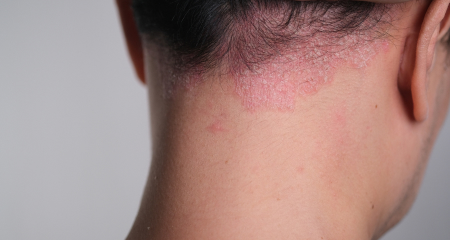
Psoriasis, marked by itchy and painful plaques, doesn’t just affect your physical health; it can also significantly influence your self-esteem and overall quality of life. For individuals seeking comprehensive psoriasis treatment, the board-certified experts at Northstar Dermatology in Keller are dedicated to meeting your needs with compassionate and personalized care. Schedule your appointment online or call our office directly.
Psoriasis can present in a variety of different ways, ranging from widespread redness to localized, pus-filled bumps on the hands and feet. It can also affect both fingernails and toenails and is sometimes mistaken for nail fungus. About 20-30% of patients may also develop psoriatic arthritis.
Plaque Psoriasis (Psoriasis Vulgaris): This is the most common form, typically found on the scalp, elbows, knees, and gluteal cleft. Sometimes the plaques itch, and in severe cases they may crack and bleed.
Inverse Psoriasis: This type affects skin folds such as the armpits, belly button, groin, and under the breasts. The plaques are thinner and often less scaly due to moisture in these areas.
Guttate Psoriasis: Rain-drop shaped blemishes (guttate) or smaller plaques that can appear across the body, often following a streptococcal infection.
Palmar-Plantar Psoriasis: This variant afflicts palms and soles, causing plaques that can crack and lead to significant discomfort.
Pustular Psoriasis: A rare form marked by small pustules that is often accompanied by other symptoms like fever. It can be triggered by infections, medications, pregnancy, or when a patient tapers off their corticosteroid usage. Certain types may appear alongside widespread or localized diseases, as in the case of von Zumbusch psoriasis, exanthematic psoriasis, palmoplantar pustular psoriasis, or acrodermatitis continua of Hallopeau.
Erythrodermic Psoriasis: This severe type rapidly spreads to cover most of the skin, making it a serious medical emergency due to the potential for massive insensible water loss and resulting cardiac risks.
Psoriasis treatment depends on several factors, including disease severity, medical and cancer history, immune status, and any medications the patient might be on. Because of this, at Northstar Dermatology, we believe a thorough physical examination is essential for tailoring the best treatment approach.
Fortunately, there are numerous options available, and newer, more effective therapies are continually emerging.
Topical Therapy
Topical medications and corticosteroids of varying strength remain central to treatment. Options like hydrocortisone, desonide, triamcinolone, mometasone, betamethasone, and clobetasol can provide anti-inflammatory relief. Additional therapies include calcipotriene (a vitamin D analog), tazarotene (a topical retinoid), and steroid-sparing agents like tacrolimus, pimecrolimus, and roflumilast (Zoryve).
Phototherapy
This approach involves exposure to specific UV wavelengths, typically UVB or narrowband UVB.
Systemic Medications
For moderate-to-severe cases of psoriasis that don’t respond to other treatments or cover too much of the body for topicals alone, we may recommend oral or injectable medications. Oral options include cyclosporine, methotrexate, and Otezla. Injectable “biologics” target specific immune pathways and include infliximab (Remicade), etanercept (Enbrel), adalimumab (Humira), certolizumab (Cimzia), secukinumab (Cosentyx), ixekizumab (Taltz), guselkumab (Tremfya), tildrakizumab (Ilumya), risankizumab (Skyrizi), and ustekinumab (Stelara), among others. Although generally safe, these treatments require lab monitoring and regular follow-ups because of their impact on the immune system.
Ready to find the treatment that’s right for you? Contact us or book an appointment online today.